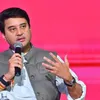Indian startups to supercharge on AI, electronics, semi-conductor: Minister of State Rajeev Chandrasekhar
Union Minister of State for Electronics & IT and Skill Development & Entrepreneurship, Rajeev Chandrasekhar, said India wants the share of digital economy to grow to 20% by 2026, from 11% now.
Going ahead, digitisation of every segment of the economy will be deep and accelerated, and successful startups will not be restricted to metro cities with the current startup policies, said Union Minister of State for Electronics & IT and Skill Development & Entrepreneurship, Rajeev Chandrasekhar.
“If you compare entrepreneurship today to where we came from as entrepreneurs, it is a different world. The government of today is rooting for your success, which was not the case in the past."
"The hurdles today are limited to your core innovation, hard work, temperament, determination. There are no external factors to worry about, like big companies messing with your work,” said the telecom entrepreneur-turned-politician at India's largest startup-tech event, TechSparks 2023, in Delhi.
The Minister said that Indian startups, especially in AI and AI research innovation, stand to benefit from the India datasets platform, which will allow startups to use anonymised personal data with consent.
“We will have, by late 2024, in place, one of the world’s biggest collections of very diverse, powerful datasets that will be used as a cue for AI,” said Chandrasekhar.
India’s stand on AI
The Indian government is aiming to increase the share of the digital economy in the country’s GDP to one-fifth or 20% by 2026, from 11% at present, with AI acting as a kinetic enabler, said the Minister.
“We see an important role for Indian innovation and startups in the future of AI, especially in real-life use cases of agriculture, governance, healthcare, language translation, and others,” said Chandrasekhar, adding that the focus will be on outcome-oriented approach.
He added that the government was looking to commit significant GPUs (graphics processing units) for AI startups as part of the Global Partnership on Artificial Intelligence Summit to be held in December in Delhi.
Growth in made-in-India
Going ahead, India will also vie to contribute significantly to the global electronics trade, with the boost given to manufacturing within the country. Apart from consumer internet, Indian startups can also look at the electronics and semi-conductor space for growth.
“In 2014, there was no export for this (mobile phone) category. Last year, India alone exported 1 lakh crore Apple and Samsung phones assembled in India or made in India,” said Chandrasekhar.
He added that, going ahead, the Digital India Future Labs programme would incentivise startups in the sector of IoT, communications and computation.
On entrepreneurship
The minister, who was an entrepreneur for 12 years before starting his political career, said there were no shortcuts to making the switch.
“There is always the risk of failure, but it is more welcoming of people from non-political background today than it was ever,” he said.
On a parting note, he said that domain knowledge and temperament were key to success rather than working round the clock.
Edited by Swetha Kannan








